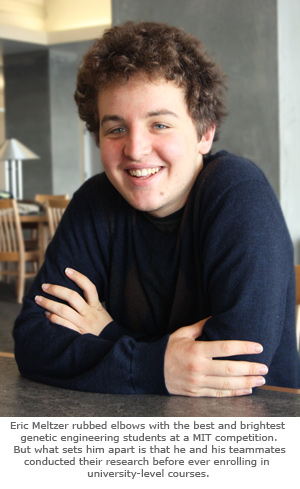

 Most graduates spend the summer between high school and college enjoying newfound adult freedoms before having to buckle down under increased academic expectations. But freshman Eric Meltzer chose a different path. He spent last summer conducting synthetic biological research in preparation for the international Genetically Engineered Machine competition (iGEM) at the Massachusetts Institute of Technology.
Most graduates spend the summer between high school and college enjoying newfound adult freedoms before having to buckle down under increased academic expectations. But freshman Eric Meltzer chose a different path. He spent last summer conducting synthetic biological research in preparation for the international Genetically Engineered Machine competition (iGEM) at the Massachusetts Institute of Technology.
Meltzer, a Palo Alto High School graduate who decided to attend UC Merced through the
Shared Experienceprogram, competed at the university-level contest on behalf of UC San Francisco. Since UCSF doesn’t have an
undergraduate program, biotechnology professor Wendell Lim recruited high school phenoms to field the school’s team.
Fate, it seems, had a hand in Meltzer’s joining the team. His uncle, a freelance
engineer, took him on a lab tour that led him to cross paths with Lim.
What excited Meltzer most was how much
synthetic biologyrelates to electronics.
“Genetic sequences are excitingly similar to electronic components,” he said.
Using that analogy, the UCSF team’s goal of creating an organelle - a compartment inside the cell - is akin to an electrical engineer making a circuit board for a device.
If it worked, scientists could program cells to manufacture substances like medicines or biofuels - and do so without harming the organisms they’re part of.
“Instead of seeing how a cell creates an organelle, we wanted to see how we would do it,” Meltzer said. “If what we did matched nature, then we’d have a good idea of how it works from the inside.”
Not only did the team’s experiment work, it earned the students a place among the contest’s six finalists - beating out teams from Harvard, MIT, Caltech and more than a dozen others.
Meltzer labels the experience as nothing short of amazing.
“At normal biology conferences, everyone is secretive about their work, but iGEM was different,” he said. “The competition didn’t overshadow the camaraderie.”
That camaraderie extends past the contest for Meltzer. Peking University has invited him to compete on its team next year. To prepare for a summer of research in China, he’s learning Mandarin.
“I can’t wait,” he said. “I have a friend over there and the Olympics will be going on. It will be a great experience.”






